Setting up SoftNAS on Century Link
Setting up SoftNAS on CenturyLink
SoftNAS deploys in a virtual appliance model, as a CenturyLink Cloud "Partner Template". Follow these step by step instructions to deploy a SoftNAS solution in to your CenturyLink Cloud account:
Prerequisite
In order to set up a SoftNAS instance using CenturyLink Cloud, you will need:
-
access to the CenturyLink Cloud platform as an authorized user.
-
to identify a Network VLAN you want the SoftNAS instance to reside on.
The Support Email
In order to integrate SoftNAS with Century Link, it all starts with an email. CenturyLink support needs to know what sort of instance you wish to setup. The email should be formatted roughly as seen below, with information matching your organizational requirements. Open a service task request ticket via email to servicetasks@ctl.io with the following details:
Note: You will need to edit some of the information below.
TO: servicetasks@ctl.io
EMAIL SUBJECT: Ecosystem Partner Template Import Request
CLC Support Team, please create a ticket to import the Ecosystem Partner Template image referenced below to my CenturyLink Cloud Account:
- Import CenturyLink Ecosystem Partner Source Image: SoftNAS OVA
- My CenturyLink Cloud Account Alias: ####
- Data Center to import image to: ###
- Server Name to import image as: ##########
- VLAN in the account to add the Server to: ########
- Additional Notes or work to be done: IMPORTANT: Please make sure that the IP shows up in Control so that the user can
add a Public IP through Portal if desired.
Please let me know if you have any questions or issues. Kindly send me a reply once the work has been completed and let us know the IP address of the server where this technology has been deployed.
Thank you very much,
Your_Name_and_Contact_ Info_Here
In the template above, the key information required is as seen below:
-
Import CenturyLink Ecosystem Partner Source Image: SoftNAS OVA
-
A Century Cloud Account Alias: Your Alias
-
Data center to import an image to: - type or copy and paste the name of the desired Data Center. In the example below, this is UC1 - US West (Santa Clara)
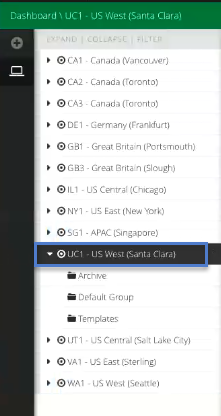
-
The Server name to import the image as: specify the desired name - in the image below SoftNAS 3-2-3.
-
The remaining information can be created/set by CenturyLink (VLAN, Password etc), but if included in the
email, the instance will be that much quicker to create.
-
Of course, your contact info must be provided as well. Contact info is removed from the example screenshot shown
below, in order to preserve privacy, but your name, email and phone number are required for Century Link to
begin their efforts.
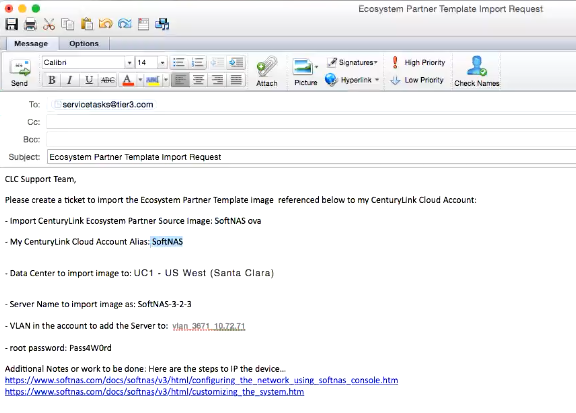
Copying the VLAN from an existing instance
If you are an existing customer and would like to match your new instance's VLAN to that of another instance on the same Data Center, you can help the service desk by providing the network settings from within the CenturyLink console. Simply log in with the information provided by CenturyLink for your prior instance.
-
To obtain your network settings, log into CenturyLink.
-
Click on Networks, under the Network tab.

-
Click the desired VLAN, and copy and paste the information from the Networks Dashboard.

-
Add the information to the email.
If this is your first instance, CenturyLink can create a VLAN for you, allowing you to edit it as desired once logged in to your instance. To edit your VLAN info, simply click the Edit button.
CenturyLink will reply with your credentials and all required server information once setup is complete.
Launching the Instance
CenturyLink will reply with credentials and all required data when the provisioning is done, based on the contact information you provide them. Log into CenturyLink, and select the Data Center that you requested the instance be built on. The instance you requested will display under the Data Center. Simply power it up.
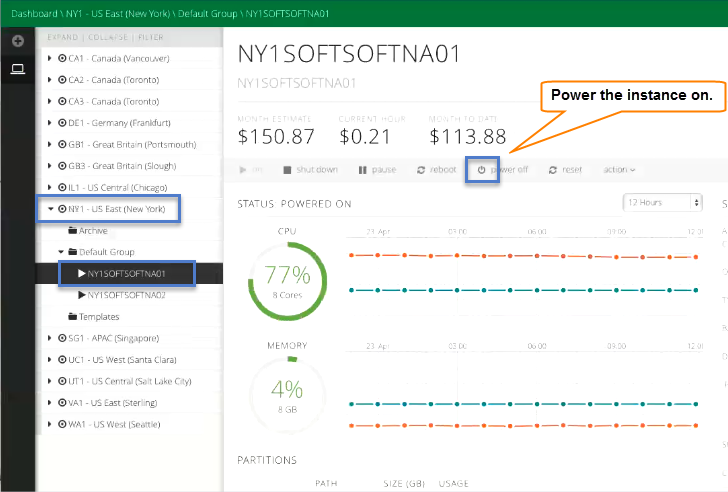
Now you are ready to configure SoftNAS. Simply log into your instance by using the IP address found in Server Info.
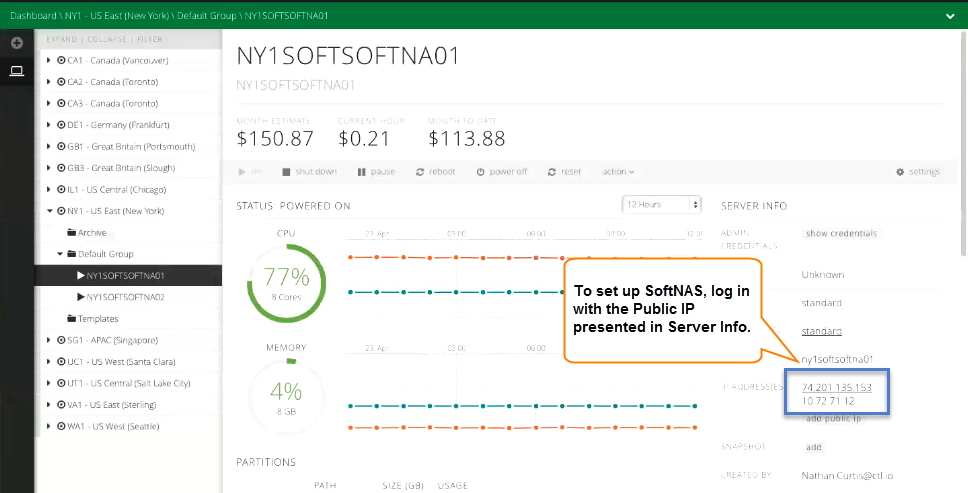
If a public IP is not yet set up, create one by clicking the button 'add public IP'. Fill in the required information.
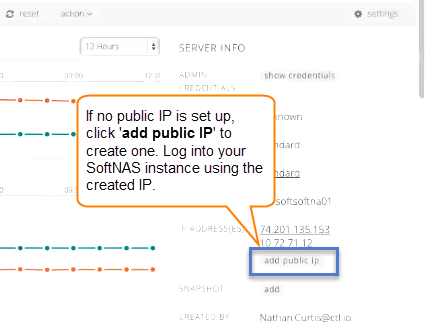
Once a public IP is set up, click it, and open your softNAS instance by entering the IP address into your web browser.
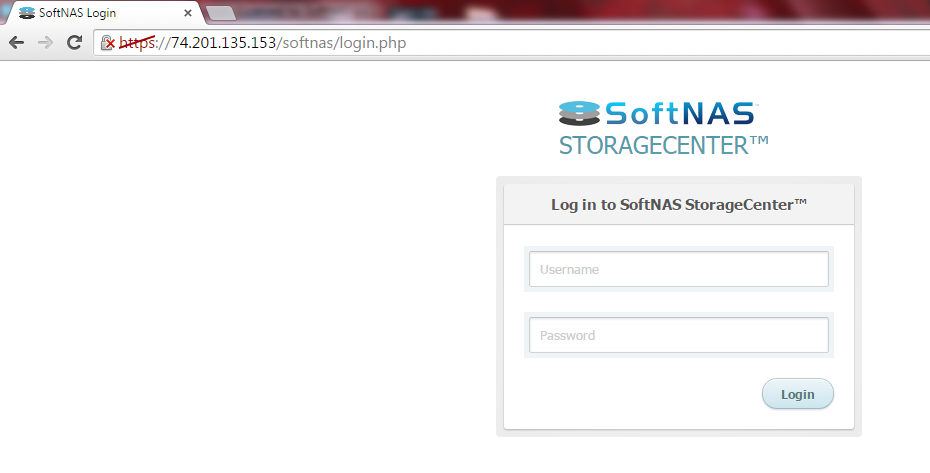
Once you have logged in, you will be presented with the option to register, as well as to provide user information, such as your email address. Provide the information, or skip till later. You will then find yourself within the SoftNAS control panel, with a checklist to help you set up your instance.
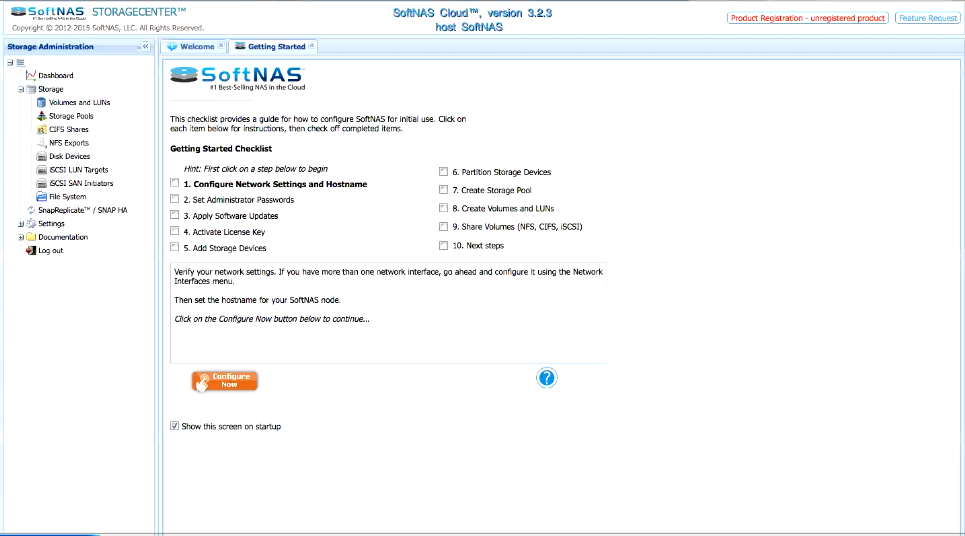
Best practices and setup information for set up of SoftNAS are covered in detail within Getting Started Helper, and the other categories falling under SoftNAS Cloud® Configuration. Follow the instructions presented in the checklist until step 5, Add Storage Devices.
Adding Storage Devices through Century Link
Typically, to add storage in SoftNAS, one would simply click on Disk Devices within the Storage Administration Panel on the left.
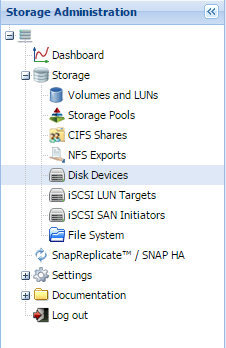
Then one would click "Add Device" and follow the steps presented in the wizard that appears. Unfortunately, for the moment, there are no APIs hooking directly to CenturyLink, in order to add storage. As you can see below, the only option available from within SoftNAS is to add S3 storage. As this is not what we want, click Cancel.
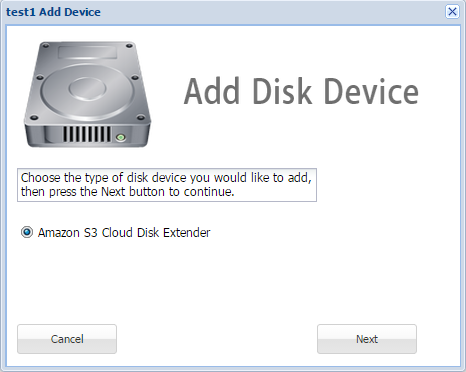
Instead, return to the CenturyLink Portal. Within the CenturyLink instance, click Edit Storage.
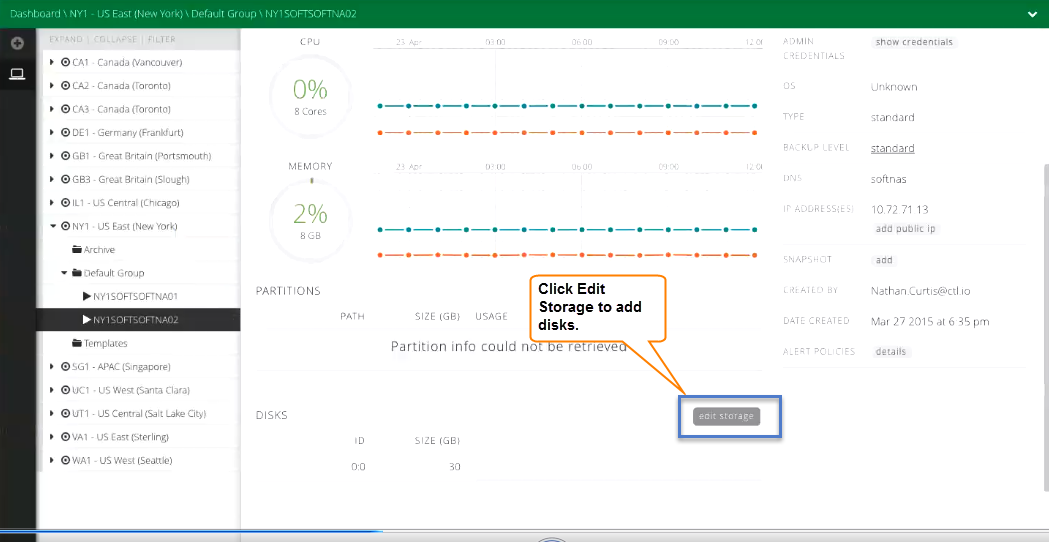
In Edit Storage, click Add Storage, then Partition.
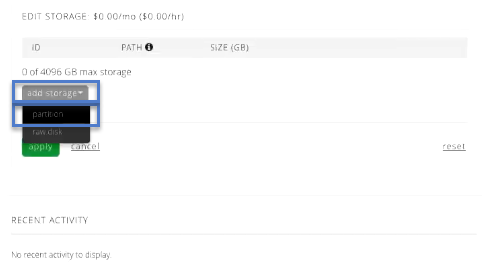
Enter a) the amount of space (in GB) for the storage, b) a drive letter, and c) click apply.
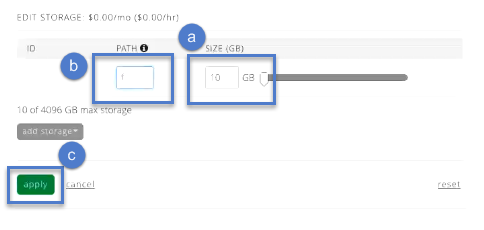
This will set up a build process within CenturyLink. If you refresh the screen, you can watch the progress of the build and see when it completes.
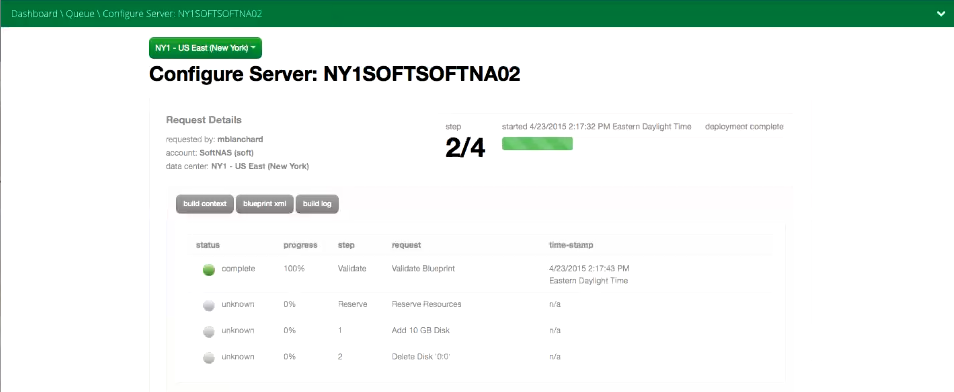
Once complete, return to SoftNAS via the public IP set up earlier. Click Disk Devices once more, and the new devices will be presented, and available to assign into pools.

Set up of pools, volumes, high availability and more are covered in the SoftNAS Cloud® Configuration section of this Installation Guide. High Availability configurations are covered in more detail within our High Availability Guide.